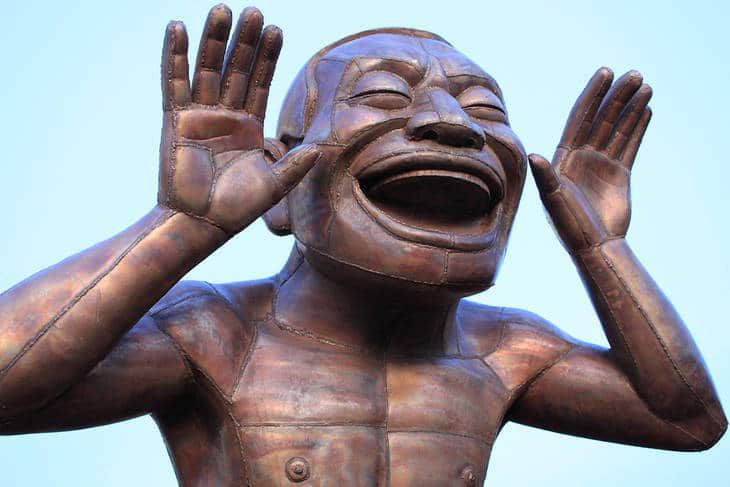
Many of us are well acquainted with our “Inner Critic.” It’s the voice that makes us second-guess our every step by saying “not enough,” “not good enough,” or sometimes “too much.” At times, the Inner Critic can be so strong that it feels invincible, but best-selling author and renowned meditation teacher Mark Coleman promises that it's not in his new book Make Peace with Your Mind: How Mindfulness and Compassion Can Free You from Your Inner Critic. We hope you’ll enjoy this short excerpt.
Mindfully approaching your critic with humour and levity
In my workshops, I make a point of bringing humour and levity to the subject of the inner critic. A seminar on judgment can be a heavy thing, so a spirit of lightness and play helps cut the heaviness that is usually weighing down on people in the room.
I will often tell a story about how you can’t win with the critic, as a way of pointing out the humour of it. For example, you might set the alarm for early in the morning because of some noble intention you have—maybe to meditate, go for a run, or do some chores before work. And when the alarm goes off, the critic, disguised as your life coach, whispers in your ear, “You know, it’s early, and you’re tired. And they say it’s really important to get enough sleep.” So you press the snooze button and hit the pillow for another hour.
Then, when you finally wake up, what happens? The critic gets on your case, this time not as a friendly coach, but as your inner tyrant: “Why didn’t you get up when the alarm went off? How come you can’t follow through on things? Why don’t you ever do any exercise in the morning? You are never going to get in shape. Just another thing to add to your list of failures.” You are doomed if you listen, doomed if you don’t. You can’t win. It is important to see how often, when it comes to the critic, it is a no-win situation. It will tell you to do one thing and then judge you in the next breath for doing that same thing. So it is helpful to see the humour in it. Otherwise it can be just too painful. With a bit of perspective it’s easy to see how laughable this is. But when you believe it, it’s plain misery.
Mindfulness provides the space in which to see the humour. If we are too close, too identified with the voice, we get caught up in the judgments and suffer unnecessarily. It is the space of awareness and non-identification that gives us perspective to see the irony of our human condition. Just as comedians use humour to point out our foibles and quirks, we can do the same with our judge and point out its idiosyncrasies.

One of the ways I play with the critic is making a joke of my own not-so-perfect habits, which the critic would normally crucify me for. I don’t have the best memory, especially when it comes to keeping track of physical stuff, like my keys or wallet. And, like many people, I often leave for an appointment with not quite enough time to be punctual. So there is often pressure for me to be able to quickly grab all the things I need, just before leaving the house. And when the inevitable happens and I can’t find something I need to find fast, then instead of judging myself, I just say, “Mr. Mindfulness wins the day.”
I poke fun at the fact that I’m a mindfulness teacher who sometimes is not aware where he left his checkbook. Not something people would expect if they believe that a mindfulness teacher should always be present! It is the same if I get lost, or forget something at the grocery store even if I had the thing written on my shopping list. “Mr. Mindfulness goes shopping,” I say to myself with half a smile, which undercuts any sting from the critical remarks of the judge.
This is not to abdicate responsibility, stop finding ways to be more efficient, or avoid getting help with organizational skills. It is about not getting down on myself for the small things in life and the particular quirks of my nature that will most likely express themselves. Listening to all the demands of your critic and engaging in a never-ending quest to be perfect are not the solution. Instead you can transform your relationship to the critic, using all the tools at your disposal, including the secret weapon of humor.
The helpfulness of cartoons
Sometimes cartoons can be useful in helping us inject humour into our relationship to the critic. In one New Yorker cartoon, for instance, a woman is asking her husband in a somewhat derogatory way, “It was only one Nobel Prize you won, wasn’t it, sweetheart?”
Similarly, in a comic strip called Rhymes with Orange, there is a cartoon titled “The Checklist to Feeling Pathetic.” It depicts some of the ways we sadly and comically make ourselves feel terrible. In one caption it says, “Think of all the people you regularly disappoint.” When I’m reciting the cartoon, I add “especially those who share your last name!” The last caption, my favorite, says, “Relive embarrassing and awful moments that occurred years ago.” This is a common mental pastime and one that never leads to a happy ending, especially in the hands of the critic.
When we laugh, not only do we learn not to take the critic so seriously, but we also connect with others in our common humanity. We take the judgments less personally. We see that our mind is a little crazy and that it’s okay if we hold it lightly.
Read more about how humour can benefit a person's life in LAUGH YOUR WAY TO HIGHER CONSCIOUSNESS: An exploration of the complex yet uplifting nature of humour» and HUMOUR HEALS: Getting silly with the residents of Mother Teresa’s NYC hospice for the dying»
image 1: Chris Huggins (Creative Commons BY); image 2: Stefan Georgi (Creative Commons BY-NC-SA)
Click to Post
